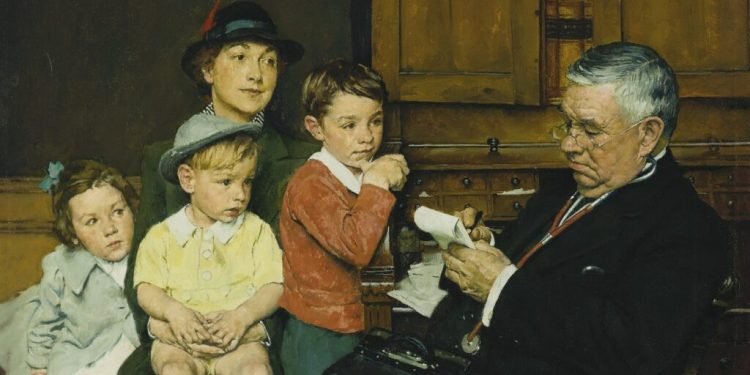Norman Rockwell’s 1939 portray “When the Physician Treats Your Little one” depicts a household physician with a stethoscope round his neck scribbling a prescription in entrance of three kids, one sitting on his mom’s lap. The portray evokes the well being care covenant: one physician accountable for the household in addition to for the group, whose skilled ethics required unfaltering dedication to their affected person’s well-being.
Well being care supply right now bears little resemblance to that iconic portray. It has moved from a main care mannequin to team-based approaches wherein care is delivered by a mosaic of handoffs that embrace main care medical doctors, allied well being professionals, masking medical doctors, and specialists. Most main care clinicians have little time to spend with their sufferers and households, and so typically miss clinically vital insights and psychological and social elements that may be woven into the care they advocate. Nor are there sufficient hours within the day to ship all of the advisable care.
In Rockwell’s time, physicians have been accountable not solely to their sufferers and households but in addition to their communities. Certainly, skilled livelihoods have been typically linked to popularity. Right now, well being care professionals should steadiness accountability to their sufferers with their accountability to different stakeholders, together with well being plans and employers; should take note of productiveness metrics; and should be aware to keep away from interactions with the authorized system.
commercial
Acute and continual diseases have been a part of a affected person’s care journey spanning careers and lifetimes. There was no ambiguity as to who was accountable for offering coordinated care suggestions — their physician. Right now, up to $80 billion a yr of wasted well being care spending is attributed to poor care coordination.
However maybe probably the most regarding change is the erosion of a constant human connection as a part of the care expertise, a way that we as sufferers are absolutely understood by trusted professionals who genuinely care about us.
commercial
Well being care is evolving as a consequence of economics, variable high quality, and an unsatisfactory shopper expertise. The U.S. spends more than $4 trillion on well being care every year, 25% of which is wasted. And the nation doesn’t obtain as a lot worth on measures of well being care system efficiency comparable to entry to care, administrative effectivity, well being fairness, and well being outcomes as other nations that spend far less.
Even in Rockwell’s seemingly idyllic portrait of a bygone period, the truth was far lower than preferrred. The precise care choices have been comparatively primitive whereas the standard of the care different, because it does right now. And business forces have been already in play: Upjohn, the corporate that sponsored this portray, was making an attempt to hyperlink its new artificial prescription drugs to the belief of a household physician (and Rockwell’s superstar).
Customers are rightfully unhappy, physicians are burning out, and well being care continues its trajectory of unbridled spending. Change is required and the market is delivering it — although it isn’t but clear how the brand new care supply approaches and the standard ones will coexist or compete and the way customers will navigate among the many choices.
Well being plans, medical suppliers, retail pharmacies, and myriad digital well being tech companies are experimenting with new care supply fashions geared toward bending the fee curve, enhancing high quality, providing a up to date shopper expertise and, in some situations, making a revenue. Some are express makes an attempt by employers and insurers to intercept doubtlessly high-cost care and redirect it to extra environment friendly venues. Others are focusing on customers instantly with the promise of a greater, lower-cost well being care expertise.
Individuals more and more entrust their care to apps and telemedicine suppliers whose credentials, accountability, and high quality of care are opaque. The evolving well being care market assumes that well being care is a commodity that doesn’t require long-term relationships, a lot much less the necessity to abide by a covenant of care.
Customers could profit from having extra choices, however selecting amongst them might be difficult with out reliable means to check prices and high quality. The place ought to one search assist for again ache, diabetes, or different acute or continual issues: a telemedicine service advisable by an insurer? Amazon/One Medical, CVS Well being, or the most recent investor-backed well being care bot powered by state-of-the-art synthetic intelligence? How ought to care throughout these websites be coordinated? How can people be assured that these venues are dedicated to their well-being?
Alarming penalties of recent well being care supply entrants have already emerged, comparable to inappropriate drug prescribing, when a enterprise mannequin turns into the dominant consideration in offering well being care. Companies geared toward lowering prices will discover methods to take action — however caveat emptor.
There are methods ahead. Organizations concerned in choosing choices for medical insurance (comparable to employers) or delivering well being care providers ought to require comprehensible requirements for high quality of care and transparency across the {qualifications} of affiliated suppliers and establishments in addition to the prices of care. People ought to acknowledge they’re buying merchandise that don’t have the reliability of commodity standing. Shopping for well being providers is just not like shopping for electrical energy; customers should be taught to navigate complexity and be savvy patrons. Programs to make sure that constant, high-quality care is delivered no matter setting should be superior. This contains applicable workflow instruments, data providers, high quality requirements, analytics, and enough well-trained employees to make sure that customers obtain optimized well being outcomes wherever they obtain care.
These efforts will, ideally, assist us all rediscover that well being care is actually a covenant and never a commodity.
Peter A. Bonis is the chief medical officer at Wolters Kluwer Well being, a gastroenterologist, and an adjunct professor of drugs at Tufts College Faculty of Medication in Boston.











